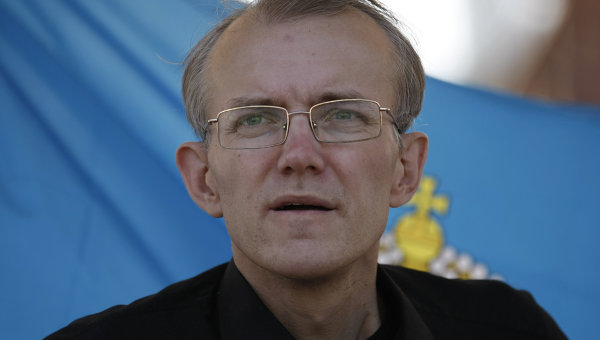
Oleg Shein, the Astrakhan, Russia mayoral candidate who is on hunger strike protesting his election loss, which he is convinced was rigged. Photo credit RIA Novosti/Evgeniy Polonskiy
It’s an interesting time to be in Russia. As democracy goes, the country seems to be going backwards and forwards at the same time.
The holding of free and fair elections is widely considered one of the hallmarks of a stable democracy. Here Russia seems to be struggling. In March Vladimir Putin won a third term as president. Opponents cried foul, claiming the election rigged: in particular they accused groups of voters of casting ballots in multiple locations, which has been termed “merry-go-round” voting. From the opposition view, BBC characterized the election as “a pre-cooked theatrical display, manipulated to produce the result the Kremlin always wanted.” While the extent of electoral shenanigans remains contested, most outside observers seem to agree that those in power employed some questionable at best, illegal at worst, tactics to make sure they stayed in power.
Democracies are also expected to allow opposition and protest to the ruling group. Recently Russia has thrived in this area: results of parliamentary elections last December and the presidential election in March sparked enormous protests and displays of outrage (see picture galleries here). Russians are expressing there displeasure with government in record numbers.
Yet now, almost 2 months since the election, protests seem to have fizzled out. They have not resulted in much notable change. Fair election or not, Putin is about to take presidential office again. So how do opposition organizers plan to keep the fire burning, to let the government know they want fairly elected officials?
For many, the solution that first comes to mind is technology. It seems to be the organizing tool of choice these days for attracting followers to your cause. After all, social media tools drove the Arab Spring last year; Internet organizing also played a big role in creating the March post-election protests in Russia.
But if the opposition there is to make real progress, relying on technology seems problematic. For one, consider that about 46% of the Russian population doesn’t use the Internet (according to independent research group Levada Center). At all (I know, I’m amazed too). So what’s the point of organizing a protest rally on Facebook if 46% of potential protesters won’t even know it exists? For another, 4 of 5 people in the country get their news primarily from television: television which is state- (and Putin-)controlled, and usually keeps opposition on the outside looking in.
So what’s a technology-based opposition movement to do in a place that lacks (accessible) technology? As Michael Birnbaum describes in a fascinating Washington Post article, they do what protesters did before the Internet: make things happen yourself. Like, in person. As one opposition organizer put it, “When you have no opportunity to go on TV, you go and you shake a million hands.”
Recently Russian protesters have begun to utilize tactics that would be right at home in Gandhi’s India or the U.S. Civil Rights movement: hunger strikes, disrupting public events, and labor strikes. In the provincial city of Astrakhan opposition mayoral candidate Oleg Shein, who felt he lost in a fraudulent election, professed anger by going on hunger strike (unfortunately most residents didn’t know he was doing it until several weeks in, since it wasn’t reported on TV).
In addition, Shein–backed by a cadre of journalists and other supporters–busted into a local parliament meeting and refused to leave until his allegations were brought before the entire legislature. Shein maintains this action developed organically, without aid of the Internet. With reporters in his corner ready to spread the word about his cause, the government relented. Shein commented, “When we have publicity, we can talk about developing democratic tools.”
Shortly after, city bus drivers helped advance Shein’s cause even more by parking their vehicles around the ancient fortress downtown, blocking access and threatening to go on strike.
What remains to be seen is how much of a real impact these actions, while no doubt dramatic, will really have (and on what scale). For example, Shein’s hunger strike won’t get Putin booted from power. But the opposition hopes demonstrations like his will rally people to their cause, at least get the attention of the Kremlin and get national leaders to think they must address claims of election fraud, and provide a launching point for a larger movement.
If nothing else, the Astrakhan events show that elements of democracy do exist in Russia. They also show that the Russian opposition movement can reach people and orchestrate protests in multiple ways that don’t depend on technology.
And who really knows where these developments will lead? After all, every revolution starts somewhere.